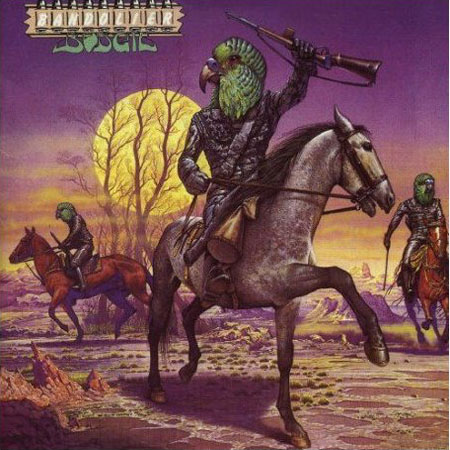From the Beginning: A Biography of Emerson, Lake and Palmer
With the metamorphosis of psychedelia into progressive rock, during the late nineteen-sixties, Emerson, Lake and Palmer came to epitomise the new genre. They were also one of the first so-called supergroups, combining well-known musicians from established bands into a progressive rock hybrid. Emerson, Lake and Palmer were known for the dominant synthesizer playing of Keith Emerson as well as their often classically inspired arrangements. Along with their exemplary musicianship, one of the band's unique features was that, despite the sidelining of guitars, they remained a heavy rock band.
Emerson Lake and Palmer were formed in late 1969 after a chance meeting between Keith Emerson, keyboard player with The Nice, and Greg Lake, singer and bassist with King Crimson. They later added drummer Carl Palmer from Atomic Rooster, when an original plan to link up with Jimi Hendrix and Mitch Mitchell came to nothing, and made their debut at The Guildhall, Plymouth, on 23rd August 1970. But, it was their performance six days later, at the Isle of Wight Festival, that drew attention to the band. Keith Emerson had already established a reputation as an adept organist and was a showman who had stirred up controversy with The Nice by burning the stars and stripes during a performance of Leonard Bernstein's America. Greg Lake had cut his teeth with The Gods (a prototype Uriah Heep) and King Crimson, being possessed of a high quality choir boy-type voice and an underrated guitar-playing ability. Carl Palmer had played with Chris Farlowe & the Thunderbirds, at the age of sixteen, then joined The Crazy World of Arthur Brown, with Vincent Crane, and accompanied the latter to Atomic Rooster. Emerson and Lake were beginning to stagnate with their respective bands, but gelled with each other immediately. Carl Palmer was reluctant at first, as Atomic Rooster was his new band, but when he played with Emerson and Lake, they all knew this was a unique and dynamic trio which would combine musical finesse with showmanship.
From the outset, Emerson, Lake and Palmer established a reputation among fans as a furiously active trio of unsurpassed technical ability, but the press were quick to accuse them of having no sense of humour and a lack of feeling. The most common adjectives being, 'bombastic', 'overblown' and 'pretentious'. BBC Radio One DJ John Peel famously accused them of being, "A waste of talent and electricity." Peel added that his colleague, Alan Freeman, had turned Emerson, Lake and Palmer from millionaires into even wealthier millionaires.
The first self-titled album (Island, October 1970) achieved reasonable chart success and the second, a concept album, Tarkus (Island, June 1971), made inroads into the American market. Emerson, Lake & Palmer contained many classical adaptions which was to give ELP their distinctive style and they continued to use this approach until their final album. The Barbarian is an arrangement of Hungarian composer Bela Bartók’s piano piece, Allegro Barbaro (1911). Knife Edge is borrowed from the first movement of Polish composrer Leoš Janácek's Sinfonietta (1926), apart from the organ solo, which is a quotation of the Allemande of JS Bach's 1st French Suite in D minor, BWV 812. Pictures at an Exhibition (Island, November 1971) should have been the second album, but was witheld by the record company because, as a live performance of a classical piece by Russian composer Modest Mussorgsky, it seemed too esoteric. However, the success of Tarkus resulted in Pictures' release as a budget album and it built on the success of its predecessors. Another facet of ELP's work is comedy songs, making a nonsense of the press criticism that the band lacked a sense of humour, and Tarkus has Jeremy Bender and Are You Ready Eddy? (a tribute to their producer Eddie Offord).
Trilogy (Island, June 1972) became the band's breakthrough work and was followed by the epic Brain Salad Surgery. Trilogy continued the classical influences with Abbadons Bolero, an adaption of Maurice Ravel's piece with two beats/rhythms, hence the overdubs, and Hoedown from Aaron Copland's Rodeo. Comedy come in the form of The Sheriff. Whereas, ELP had Greg Lake's solo piece Lucky Man (which includes a groundbreaking synthesizer solo), Trilogy has From the Beginning. The title track has a lilting introduction but becomes much heavier and is very experimental in its use of synthesizers. Living Sin is full-on heavy rock.
Brain Salad Surgery (Manticore, November 1973), the first album on the band's own label, continued the experimentation and Carl Palmer has said that, by this stage, every time the band tried something, it worked. Jerusalem is a heavy rock version of Hubert Parry's hymn and shows the influence of church music in the formative stages of British progressive rock musicians. The instrumental, Toccata, is based on the Fourth Movement of Alberto Ginastera's 1st Piano Concerto, arranged by Keith Emerson with special synthesised effects; Carl Palmer adding a percussion accompaniment using newly-developed drum synthesisers. Unlike Bernstein, Alberto Ginastera liked Emerson's arrangement of his work. Still . . . You Turn Me On is a Greg Lake solo track. Benny the Bouncer is a sinister comedy song about a doorman's clash with a greaser. Karn Evil 9, in three impressions, dominates the album and is about the creation of computers, which are subsequently blamed for man's inadequecies. The lyrics were co-written with former King Crimson lyricist, Pete Synfield, who went on to work with Bucks Fizz and Celine Dion. Artwork for the album is by HR Giger, similar to, but created sometime before his 'organic' designs for Ridley Scott's Alien. Brain Salad Surgery, despite a murky production, is Emerson, Lake and Palmer's masterpiece and stands as one of the great progressive rock albums alongside Court of the Crimson King, Nursery Cryme, Dark Side of the Moon, Close to the Edge and Fragile.
Originally written in April 2012









.jpg)


 Linear Mode
Linear Mode
